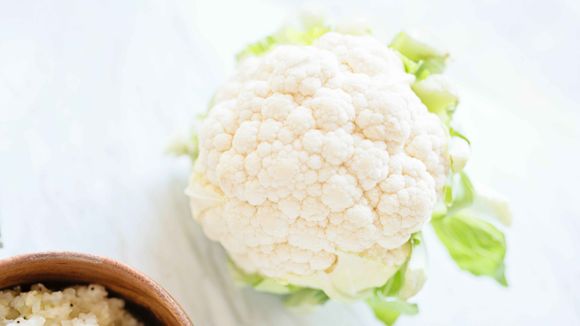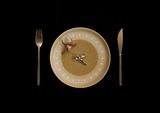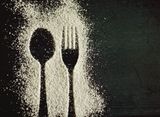What is cauliflower
Cauliflower is one of several Brassica Oleracea vegetables of the genus Brassica, which is from the Brassicaceae family. [ [ref. 1] ] Cauliflower provides valuable antioxidants to counteract oxidative stress, as well as phytonutrients [ [ref. 2] ] that can protect against the development of cancer. [ [ref. 3] ] Contains fiber to improve weight loss and digestion; choline, which is essential for learning and memory, and many other important nutrients, namely:
- Fiber: 3 grams
- Vitamin C: 77% (% RDA)
- Vitamin K: 20% (% RDA)
- Vitamin B6: 11% (% RDA)
- Folate: 14% (% RDA)
- Pantothic acid: 7% (% RDA)
- Potassium: 9% (% RDA)
- Manganese: 8% (% RDA)
- Magnesium: 4% (% RDA)
- Phosphorus: 4% (% RDA)
Health Benefits of Cauliflower
High in fiber
Cauliflower is quite high in fiber, which is useful for the digestive function. In one cup of cauliflower there are 3 grams of fiber, which is 10% of your daily needs. Fiber is important because it supports intestinal microbial balance, and this helps reduce inflammation and promotes digestive health and immune function. [ [ref. 4]
A great source of antioxidants
Cauliflower is a great source of antioxidants that protect your cells from harmful free radicals and inflammatory processes in the body. Like other cruciferous vegetables, cauliflower is especially rich in glucosinolates and isothiocyanates. These are two groups of antioxidants that have been shown to slow the growth of cancer cells. [ [ref. 5] ] In vitro studies, glucosinolates and isothiocyanates have been shown to protect against colon, lung, breast and prostate cancer. [ [ref. 6] ]
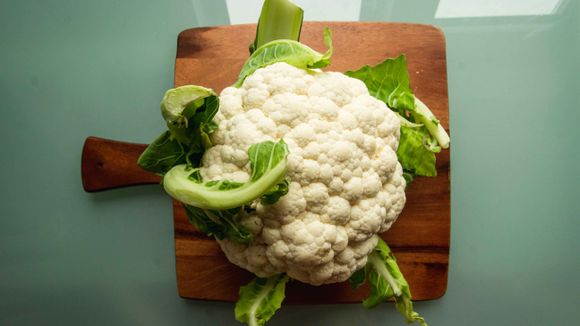
Cauliflower is useful in a weight loss regime
Cauliflower has several properties that can help with weight loss. First, it is low-calorie - it contains only 25 calories per cup, so you can eat a lot of it without worrying about calorie intake. It can also serve as a low-calorie substitute for high-calorie foods, such as rice and flour. High water content is another aspect of cauliflower that is beneficial for weight loss. In fact, 92% of its weight consists of water (similar to cucumbers).
High Choline Content
Cauliflower is high in choline - a basic nutrient from which many people have a deficiency. One cup of cauliflower contains 45 mg. choline, which is about 11% of the optimal daily intake for women and 8% for men. Choline has several important functions in the body. It plays a major role in maintaining the integrity of cell membranes, synthesizing DNA and supporting metabolism. Choline is also involved in brain development and the production of neurotransmitters that are necessary for a healthy nervous system. [ [ref. 7] ]
Cauliflower is a rich source of sulforaphane
Cauliflower contains sulforaphane - a well-studied antioxidant. Many in vitro and animal studies have found that sulforaphane is particularly useful for suppressing the development of cancer by inhibiting the enzymes involved in cancer and tumor growth. [ [ref. 8]
Sulforaphane, according to studies, is most effective against colorectal and prostate cancer, but has also been studied for its effects on many other cancers, such as breast cancer, leukemia, pancreas and melanoma.
Recipes for preparing cauliflower
Cauliflower is found broadly in culinary and can be used to replace cereals and legumes in your diet. Let's see a few options:
- Cauliflower rice: Replace the white or brown rice with cauliflower, which has been grated and then boiled.
- Cauliflower pizza crust: By blending the cauliflower into a food processor and then making it into a dough, you can make a delicious pizza crust.
- Cauliflower hummus: Chickpeas can be replaced with cauliflower in hummus recipes.
- Cauliflower puree: Instead of making mashed potatoes, try a recipe for low-carb cauliflower puree, which is easy to prepare.
- Cauliflower tortillas: Combine ground cauliflower with eggs to make low-carb tortillas.
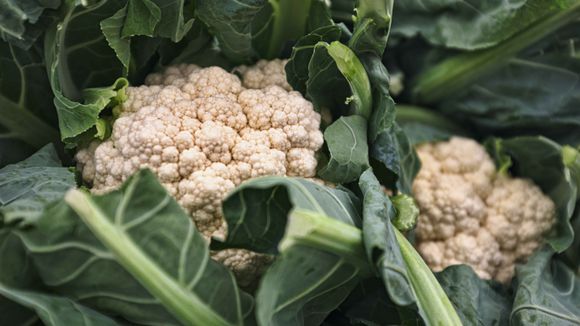
Recipe for pizza with cauliflower crust
For cauliflower marshes:
- 1 head cauliflower, chopped
- 2 large eggs
- 1/2 cup grated mozzarella cheese
- 2 tablespoons freshly grated Parmesan
- 1 tablespoon Italian spice
- Kosher salt and freshly ground black pepper to taste
Products for stuffing:
- 1/2 cup pizza sauce
- 1 cup grated mozzarella cheese
- 1/2 cup grated cheddar cheese
- 1/4 cup mini pepperoni
- 1/4 cup fresh basil leaves
- 1/2 teaspoon paprika flakes, optional
Instructions for preparation:
- Preheat the oven to 220°C. Put baking paper in a baking tray or silicone baking pan; set aside.
- To make cauliflower crust, add cauliflower to the bowl of a food processor and blend until homogeneous, until about 2-3 cups are obtained.
- Transfer to a bowl suitable for microwave. Cover freely and place in a microwave for 4-5 minutes or until softened; leave to cool.
- Using a clean cloth or cheesecloth, drain the cauliflower completely, removing as much water as possible.
- Transfer the cauliflower to a large bowl. Stir in the eggs, mozzarella, parmesan and Italian spice; season with salt and pepper, to taste.
- Spread the cauliflower mixture in a 40-by-25cm pan. or similar on the prepared baking sheet. Spray lightly with non-stick cooking spray and bake for 12-15 minutes or until golden.
- Top with pizza sauce, cheeses and mini pepperoni. Place in the oven and bake until the cheese has melted, about 3-5 minutes.
- Serve the sprinkled pizza immediately with basil and flakes of paprika as desired.

Recipe for keto casserole with cauliflower
You will need the following products:
- 1/2 head cauliflower blossoms
- 1 cup grated Cheddar cheese
- 1/2 cup cooking cream
- 1 pinch salt and freshly ground black pepper to taste
Instructions for preparation:
- Preheat the oven to 200 degrees.
- Put a large saucepan of lightly salted water to bring to a boil and cook the cauliflower until softened, but remain slightly firm, about 10 minutes. Then drain it.
- Combine cheddar cheese, cream, salt and pepper in a large bowl. Arrange the cauliflower in a saucepan and cover with a mixture of cheese.
- Bake in a preheated oven until the cheese is bubbled and until golden brown, about 25 minutes.
